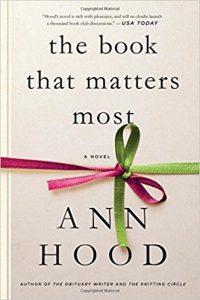Tag Archives: reading
The Little Free Library
Now that the days are dwindling and the nights are long, it’s a good time to reflect on those who light candles for the rest of us. We were in St. Petersburg, Florida, walking in its historic neighborhood when we first came upon the Little Free Library in someone’s front yard. It was actually a small, colorfully painted wooden box with glass doors, and it rested on a pedestal about four feet high. Inside were a selection of books with a sign saying, “Take a book. Leave a book ” We’d never seen such a thing before. Since then, I’ve come across these boxes elsewhere, even in my own neighborhood in Columbia, MD. There are over 75,000 Little Free Libraries across the globe.
THERE ARE GREAT NOVELS AND THEN THERE ARE CLASSICS
At a recent book club meeting, one of our members remarked that because the club had such mixed feelings about the novel Exit West, it likely wouldn’t become a classic. “A classic,” he said, “has to have good writing, characters we care about, a good story, and a deeper meaning.” Since we couldn’t agree about the characters or the writing, Exit West fell short.
A lot of scholars, writers, editors, and others in the literary world have defined “classic literature,” and doing a little research on the subject, I found that most of the definitions are similar to what my book club member suggested. Mark Twain had the most succinct definition—“a book which people praise and don’t read”—but assuming novels are read, I think the true standard for classic is that the novel has stood the test of time.
AN IDEA THAT MATTERS
The first thing that intrigued me about the novel I’m about to review was the title: The Book That Matters Most. With all the great books in the world, choosing one that matters most seems nearly impossible, so I was curious to see where the author would lead me. The second thing that intrigued me was the main character, Ava, whose husband has recently left her for a woman who attempts to personalize public places by covering objects with colorful yarn.
title: The Book That Matters Most. With all the great books in the world, choosing one that matters most seems nearly impossible, so I was curious to see where the author would lead me. The second thing that intrigued me was the main character, Ava, whose husband has recently left her for a woman who attempts to personalize public places by covering objects with colorful yarn.
But the deeper I got into the novel, I found I was most captivated by the idea that novels have the power to change lives. I’ve written before about the way fiction can decrease readers’ needs to reach quick conclusions in their thinking and to avoid ambiguity and confusion.
AUDIOBOOKS: FILLING TIME OR FILLING THE MIND?
Are audiobooks a substitute for physical books, or even e-books? What do you gain by hearing versus reading a book? What do you lose? And does anyone else feel as lost as I do without a physical book to devour?
I asked these questions last month (Audiobooks: The Chinese Food of Literature) because I noticed that listening to audiobooks was not as fulfilling as reading books. Audiobooks obviously have a place, and considerable merits. But even when I’m “reading” an audiobook, I still feel hunger for a book. A real book.
Despite the audiobook ads claiming that “listening is the new reading,” the experience I have with audiobooks doesn’t feel quite like “reading” to me. I wondered if anyone else felt similarly.
AUDIOBOOKS: THE CHINESE FOOD OF LITERATURE?
 I’ve got that craving again, that gnawing, empty feeling I get when I am not reading a book. Over the holidays I tidily finished up Henry James’s Daisy Miller , Paul Auster’s Mr. Vertigo, and a nonfiction book. Since then I’ve been tearing through old magazines and listening to audiobooks. Just yesterday I spent four hours listening to an audiobook while on the road. And I will listen to more of it when driving into town today.
I’ve got that craving again, that gnawing, empty feeling I get when I am not reading a book. Over the holidays I tidily finished up Henry James’s Daisy Miller , Paul Auster’s Mr. Vertigo, and a nonfiction book. Since then I’ve been tearing through old magazines and listening to audiobooks. Just yesterday I spent four hours listening to an audiobook while on the road. And I will listen to more of it when driving into town today.
This audiobook is superb: Sebastian Haffner’s memoir, Defying Hitler. I look forward to finishing it. And yet I feel empty, and bookless.
Remember that old saying about feeling hungry again an hour after eating Chinese food? I’m beginning to wonder if audiobooks are the Chinese food of literature.
A Reader’s Reader
“I have always imagined that Paradise will be a kind of library.”
—Jorge Luis Borges
I had the distinct pleasure recently of being on a panel at the Washington Writers Conference with Tom Shroder—author, ghostwriter, journalist, and long-time editor of the Washington Post Magazine—and Michael Dirda, even longer-time book critic at the Washington Post and elsewhere. We were discussing the fuzzy lines that separate memoir, family history, and fiction.
As part of preparing for the panel, I read two of Michael’s several books: his most recent, Browsings, and his memoir of the first third of his life through college, An Open Book.
When Your Favorite Author Breaks Your Heart
Musings: When Your Favorite Author Breaks Your Heart
I’m a frequent reviewer for both the daily Washington Independent Review of Books (WIRoB) and the quarterly Historical Novels Review of the Historical Novel Society (HNS). As an author and avid reader, I find that reviewing offers a host of benefits for me. Not only do I end up reading books outside my normal genre preferences, which is good for me as a writer, it also introduces me to wonderful debut authors about whom I then get to spread the good word. Completely selfishly, it’s also pretty cool to have, say, Viking or FSG quote me in a tweet to their vast legions of followers.
But the cherry on top of the pie is the chance to review my favorite authors’ latest books.
THE PRIVATE AUTHOR—GOOD OR BAD?
9/10/2015. THE PRIVATE AUTHOR—GOOD OR BAD?
 Once upon a time authors were mysterious people, stereotyped as starving artists scratching with their pens or pecking on their typewriters in lonely garrets. William Shakespeare, for example, is a shadowy figure. We know about the times he lived in, but not a lot about him personally. The best insights we have about him lie in the words he wrote—his plays and poetry. Then came newspapers, radio, and television, and authors had the opportunity to reveal more of themselves to their readers. Today with the internet and social media, authors can share everything—in real time, even—if they want to. But as a reader, how much do you really want to know about the authors of the novels you read?
Once upon a time authors were mysterious people, stereotyped as starving artists scratching with their pens or pecking on their typewriters in lonely garrets. William Shakespeare, for example, is a shadowy figure. We know about the times he lived in, but not a lot about him personally. The best insights we have about him lie in the words he wrote—his plays and poetry. Then came newspapers, radio, and television, and authors had the opportunity to reveal more of themselves to their readers. Today with the internet and social media, authors can share everything—in real time, even—if they want to. But as a reader, how much do you really want to know about the authors of the novels you read?
What Are You Reading?
3-23-14 WHAT ARE YOU READING?
On Late Last Night Books we’re always writing about books and authors, but what are people reading? I took my questionnaire to people I know and people I don’t know, asking: What are you reading late at night? Why? What do you do by day? The answers might surprise you.
SLOGGING THROUGH THE CLASSICS
12/4/13 – SLOGGING THROUGH THE CLASSICS
I spent high school immersed in Victorian novels. My purse contained four typed 9×11 sheets listing classic works that every “college-bound” student should read, and every year I dutifully read and crossed more of them off. I defended these books vociferously for their timeless ideas, eschewing more contemporary writing, most of which, I was sure, had only ephemeral value. Though I was writing fiction of my own even back then – and certainly wanted people to read it – my goal was to write something timeless, and I thought my greatest guide to doing so would come from reading other timeless works.
Thorne Smith and the American Ghost
10/13/13 – THORNE SMITH AND THE AMERICAN GHOST
With Halloween creeping upon us, this seems the perfect time to ask a personal question: how do you like your American ghosts? Do you prefer them spooky? Atmospheric? Maybe you savor a gothic entity laced with fear and darkness, or a tale where the supernatural explores the human psyche. If so, I’ll direct you to Washington Irving, Edgar Allan Poe, or Nathaniel Hawthorne. But if (like me) you prefer the sorts of ghosts who eagerly urge you to hoist a drink or two (or twenty), then you’ll want to spend an evening with Thorne Smith.
Suspending Suspension of Disbelief
9/13/13 – SUSPENDING SUSPENSION OF DISBELIEF
In 1817, Samuel Taylor Coleridge coined the expression “willing suspension of disbelief.” Suspension of disbelief is a wonderful thing. It allows us to enjoy and accept premises in our reading that we might never believe otherwise. As originally conceived, it was the author’s job to inject enough impression of truth into an unrealistic tale that a reader could suspend judgment of the improbability of the story. But over time the responsibility has shifted from how well an author creates a fictional world to how willing a reader is to lose herself in it. In short, the onus falls on readers to believe.
VISITS TO TARA
9/1/13 – VISITS TO TARA
Millions of books were published last year. (Yes, really!) There’s a literary smorgasbord out there filled with more tasty stories than anyone could possibly devour in a single lifetime. Why, then, do we still make time to reread certain titles?